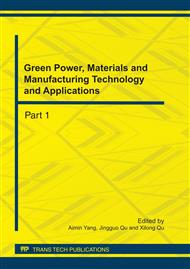p.733
p.739
p.743
p.747
p.752
p.757
p.761
p.765
p.770
Decoupling Analysis of Economic Growth and Total Primary Energy Supply for the BRICS: 1971-2008
Abstract:
The decoupling conditions of GDP and Total Primary Energy Supply (TPES) for the BRICS in the period 1971-2008 were analyzed. It is concluded that in the studied period, the decoupling indicators of China and Russia are relatively higher than that of Brazil, South Africa and India. The BRICS’s decoupling distribution is similar to China, because China accounts for most part of TPES and GDP of the BRICS. To restrain the total resource or energy consumption from increasing too fast, it is suggested to match the indicators of GDP growth and the decreasing rate of resource consumption per unit of GDP appropriately.
Info:
Periodical:
Pages:
765-769
DOI:
Citation:
Online since:
August 2011
Authors:
Price:
Сopyright:
© 2011 Trans Tech Publications Ltd. All Rights Reserved
Share:
Citation:


